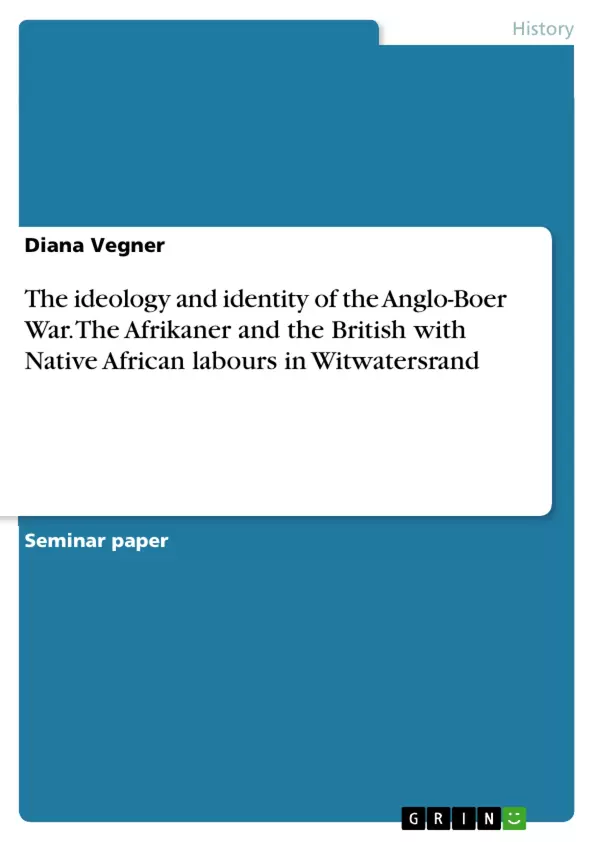This paper is about the question why a war took place in South Africa during the nineteenth and twentieth century between the Boers and the British. It aims at trying to understand and distinguish the different position, ideologies, origins, views and tensions between the “two European participants” of the war. The aim of the paper is to understand and investigate the reason of the European (and Afrikaner) hostility. Eventually, the result of the outbreak of the war. Moreover, the war was mostly interpreted as a “whites man’s war” by historians, in which only the actions and interests of the white communities in South Africa were directly involved. Unfortunately, “one” group was not really taken into consideration. First, the participation of black people in the war. Secondly, the influence of the Anglo-Boer war to the black (also white) society and environment. And third, the response by black Africans to the conflict which has been passed almost completely over the years.
The South African War (known as the Anglo-Boer War) from 1899 to 1902 remains the most destructive and terrible modern armed conflict, South Africa has experienced. The war represented itself as a powerful event, which shaped the history of South Africa in the twentieth century. The path to a major Anglo-Boer War was tortuous and involved conflicts of interest, ambitiousness and ideologies, especially between the Boer “group” and the British. In order to understand the history of the Anglo-Boer war itself and the participates in the war (the Boers and the British), it is important to know the role of Europeans in South Africa by a historical analysis.
Inhaltsverzeichnis (Table of Contents)
- Introduction / Overview
- Research Question
- Problem to be investigated
- Objective Motivation
- Personal Motivation
- The Afrikaners / Boers
- The British and Afrikaners
- Cause of the Anglo – Boer War
- Concentration Camps
- Actual Debate
- Africans in Concentration Camps
- Black African Labour in Witwatersrand
- Recruitment of African migrants
- Mozambican Workers
- The Relationship between Afrikaner and Africans
- Labour Conditions
- Forced Labour
- The End of the War
Zielsetzung und Themenschwerpunkte (Objectives and Key Themes)
This paper aims to analyze the historical events leading up to the Anglo-Boer War and its impact on South Africa, particularly focusing on the relationship between the Afrikaners, the British, and the native African labor forces.
- The historical development of the conflict between Afrikaners and the British in South Africa.
- The role of gold mining in shaping the political and economic landscape of South Africa.
- The plight of African laborers, specifically in the Witwatersrand mines and in the concentration camps.
- The consequences of the war, including the impact on the economic and social fabric of South Africa.
- The question of land ownership and its historical roots in South Africa.
Zusammenfassung der Kapitel (Chapter Summaries)
The introduction outlines the research question, which examines the reasons behind the Anglo-Boer War and analyzes the role of black Africans during the conflict. Chapter 2 provides a historical overview of the Afrikaners and their involvement in the war. Chapter 3 focuses on the British and their interest in the goldfields of Witwatersrand, highlighting the growing tensions between the two groups. Chapter 4 examines the causes of the war, including the Boer ultimatum and the ensuing conflict. Chapter 5 discusses the establishment and impact of concentration camps on both Afrikaners and black Africans, while chapter 6 delves into the role of black African labor in the Witwatersrand mines, focusing on the harsh working conditions and forced labor practices. Finally, Chapter 7 describes the end of the war and its consequences.
Schlüsselwörter (Keywords)
This paper explores the Anglo-Boer War, its causes and consequences, focusing on the complex relationship between Afrikaners, the British, and black African labor. Key themes include imperialism, land ownership, gold mining, concentration camps, forced labor, and the exploitation of black Africans.
- Quote paper
- Diana Vegner (Author), 2019, The ideology and identity of the Anglo-Boer War. The Afrikaner and the British with Native African labours in Witwatersrand, Munich, GRIN Verlag, https://www.hausarbeiten.de/document/505475


